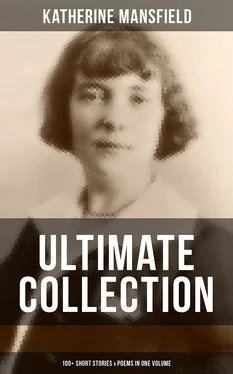All the same I had no more money than I have now. It’s extraordinary how one can live without money. . . . I have quantities of good clothes, silk underwear, two evening suits, four pairs of patent leather boots with light uppers, all sorts of little things, like gloves and powder boxes and a manicure set, perfumes, very good soap, and nothing is paid for. If I find myself in need of right-down cash—well, there’s always an African laundress and an outhouse, and I am very frank and bon enfant about plenty of sugar on the little fried cake afterwards. . . .
And here I should like to put something on record. Not from any strutting conceit, but rather with a mild sense of wonder. I’ve never yet made the first advances to any woman. It isn’t as though I’ve known only one class of woman—not by any means. But from little prostitutes and kept women and elderly widows and shop girls and wives of respectable men, and even advanced modern literary ladies at the most select dinners and soirées (I’ve been there), I’ve met invariably with not only the same readiness, but with the same positive invitation. It surprised me at first. I used to look across the table and think “Is that very distinguished young lady, discussing le Kipling with the gentleman with the brown beard, really pressing my foot?” And I was never really certain until I had pressed hers.
Curious, isn’t it? I don’t look at all like a maiden’s dream. . . .
I am little and light with an olive skin, black eyes with long lashes, black silky hair cut short, tiny square teeth that show when I smile. My hands are supple and small. A woman in a bread shop once said to me: “You have the hands for making fine little pastries.” I confess, without any clothes I am rather charming. Plump, almost like a girl, with smooth shoulders, and I wear a thin gold bracelet above my left elbow.
But, wait! Isn’t it strange I should have written all that about my body and so on? It’s the result of my bad life, my submerged life. I am like a little woman in a café who has to introduce herself with a handful of photographs. “Me in my chemise, coming out of an eggshell. . . . Me upside down in a swing, with a frilly behind like a cauliflower. . . .” You know the things.
If you think what I’ve written is merely superficial and impudent and cheap you’re wrong. I’ll admit it does sound so, but then it is not all. If it were, how could I have experienced what I did when I read that stale little phrase written in green ink, in the writing-pad? That proves there’s more in me and that I really am important, doesn’t it? Anything a fraction less than that moment of anguish I might have put on. But no! That was real.
“Waiter, a whisky.”
I hate whisky. Every time I take it into my mouth my stomach rises against it, and the stuff they keep here is sure to be particularly vile. I only ordered it because I am going to write about an Englishman. We French are incredibly old-fashioned and out of date still in some ways. I wonder I didn’t ask him at the same time for a pair of tweed knickerbockers, a pipe, some long teeth and a set of ginger whiskers.
“Thanks, mon vieux. You haven’t got perhaps a set of ginger whiskers?”
“No, monsieur,” he answers sadly. “We don’t sell American drinks.”
And having smeared a corner of the table he goes back to have another couple of dozen taken by artificial light.
Ugh! The smell of it! And the sickly sensation when one’s throat contracts.
“It’s bad stuff to get drunk on,” says Dick Harmon, turning his little glass in his fingers and smiling his slow, dreaming smile. So he gets drunk on it slowly and dreamily and at a certain moment begins to sing very low, very low, about a man who walks up and down trying to find a place where he can get some dinner.
Ah! how I loved that song, and how I loved the way he sang it, slowly, slowly, in a dark, soft voice:
There was a man
Walked up and down
To get a dinner in the town . . .
It seemed to hold, in its gravity and muffled measure, all those tall grey buildings, those fogs, those endless streets, those sharp shadows of policemen that mean England.
And then—the subject! The lean, starved creature walking up and down with every house barred against him because he had no “home.” How extraordinarily English that is. . . . I remember that it ended where he did at last “find a place” and ordered a little cake of fish, but when he asked for bread the waiter cried contemptuously, in a loud voice: “We don’t serve bread with one fish ball.”
What more do you want? How profound those songs are! There is the whole psychology of a people; and how un-French—how un-French!
“Once more, Deeck, once more!” I would plead, clasping my hands and making a pretty mouth at him. He was perfectly content to sing it for ever.
There again. Even with Dick. It was he who made the first advances.
I met him at an evening party given by the editor of a new review. It was a very select, very fashionable affair. One or two of the older men were there and the ladies were extremely comme il faut. They sat on cubist sofas in full evening dress and allowed us to hand them thimbles of cherry brandy and to talk to them about their poetry. For, as far as I can remember, they were all poetesses.
It was impossible not to notice Dick. He was the only Englishman present, and instead of circulating gracefully round the room as we all did, he stayed in one place leaning against the wall, his hands in his pockets, that dreamy half smile on his lips, and replying in excellent French in his low, soft voice to anybody who spoke to him.
“Who is he?”
“An Englishman. From London. A writer. And he is making a special study of modern French literature.”
That was enough for me. My little book, False Coins had just been published. I was a young serious writer who was making a special study of modern English literature.
But I really had not time to fling my line before he said, giving himself a soft shake, coming right out of the water after the bait, as it were: “Won’t you come and see me at my hotel? Come about five o’clock and we can have a talk before going out to dinner.”
“Enchanted!”
I was so deeply, deeply flattered that I had to leave him then and there to preen and preen myself before the cubist sofas. What a catch! An Englishman, reserved, serious, making a special study of French literature. . . .
That same night a copy of False Coins with a carefully cordial inscription was posted off, and a day or two later we did dine together and spent the evening talking.
Talking—but not only of literature. I discovered to my relief that it wasn’t necessary to keep to the tendency of the modern novel, the need of a new form, or the reason why our young men appeared to be just missing it. Now and again, as if by accident, I threw in a card that seemed to have nothing to do with the game, just to see how he’d take it. But each time he gathered it into his hands with his dreamy look and smile unchanged. Perhaps he murmured: “That’s very curious.” But not as if it were curious at all.
That calm acceptance went to my head at last. It fascinated me. It led me on and on till I threw every card that I possessed at him and sat back and watched him arrange them in his hand.
“Very curious and interesting. . . .”
By that time we were both fairly drunk, and he began to sing his song very soft, very low, about the man who walked up and down seeking his dinner.
But I was quite breathless at the thought of what I had done. I had shown somebody both sides of my life. Told him everything as sincerely and truthfully as I could. Taken immense pains to explain things about my submerged life that really were disgusting and never could possibly see the light of literary day. On the whole I had made myself out far worse than I was—more boastful, more cynical, more calculating.
Читать дальше











